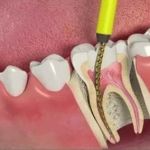What Do Dentists Do for a Cracked Tooth?
A cracked tooth can be a real concern. It can happen to anyone, often when least expected. Whether you bite into something hard or experience an accident, a cracked tooth can cause significant discomfort, and if left untreated, it can lead to more severe dental issues. I’ve had my own experience with a cracked tooth, and I learned the importance of acting quickly to get the right treatment. In this article, I’ll walk you through what happens when you visit the dentist with a cracked tooth and what procedures they may use to restore your smile.
1. Assessing the Damage: The First Step
When you visit a dentist with a cracked tooth, the first thing they’ll do is assess the extent of the damage. Not all cracked teeth are the same; they can vary from minor chips to deep fractures that reach the root. The dentist will start by looking at the tooth’s structure and may take an X-ray to understand the crack's depth and severity. The X-ray is crucial because it can reveal if the crack has affected the tooth’s nerve or if there is any underlying damage that isn’t visible to the naked eye.
Depending on the size and location of the crack, the dentist will determine the best course of action. Sometimes, a small chip may just need a filling or bonding, but deeper cracks might require more complex treatments. Early detection is key, as waiting too long can lead to further complications such as infections or the need for a root canal.
2. Bonding: A Simple Solution for Minor Cracks
If the crack is minor and doesn’t extend deep into the tooth, your dentist may recommend dental bonding. This is a relatively quick procedure where the dentist applies a tooth-colored resin to the cracked area. The resin is shaped to match the natural contours of your tooth and then hardened with a special light. Bonding is a cost-effective and non-invasive solution, and it can restore both the functionality and appearance of your tooth. I’ve had this done for a small crack, and the results were seamless. The tooth looked and felt as good as new!
Bonding is generally used for small chips or cracks on the front teeth where appearance matters most. It’s a great option for people looking for a fast, affordable fix, but it’s not as durable as some other treatments, so it may need to be touched up after a few years.
3. Dental Crowns: Strengthening the Tooth
For a more significant crack, especially one that affects the tooth's structure, a dental crown may be recommended. A dental crown is a cap that covers the entire tooth, restoring its shape, size, and function. It’s often used for cracks that have weakened the tooth or left it vulnerable to further damage. Crowns are typically made from porcelain, metal, or a combination of materials, ensuring durability and a natural appearance.
The process of getting a crown typically involves two visits. During the first visit, the dentist will clean and reshape the cracked tooth, taking an impression to create a custom crown. While the permanent crown is being made, you’ll receive a temporary crown to protect your tooth. At the second visit, the dentist will remove the temporary crown and place the permanent one, cementing it in place for long-term protection. Crowns are a great solution for cracked teeth that need extra support, and they can last for many years with proper care.
4. Root Canals: A Necessary Procedure for Deep Cracks
If the crack has reached the tooth's pulp or nerve, a root canal may be required to save the tooth. This is more common in deep cracks that cause pain or discomfort. During a root canal, the dentist will remove the damaged pulp from inside the tooth and clean out any infection. After the pulp is removed, the tooth is sealed, and a crown is often placed over the tooth to protect it. Root canals sound intimidating, but they are quite common and are performed to prevent further decay or infection that could lead to tooth loss.
In my experience, having a root canal isn’t as painful as it sounds, especially with modern anesthesia and sedation options. The recovery time is minimal, and the tooth is usually good as new afterward, allowing you to go back to your regular activities with minimal disruption.
5. Tooth Extraction: A Last Resort for Severe Cracks
In some cases, a cracked tooth may be beyond repair, and extraction is the only option. This usually happens when the crack has compromised the tooth to the point where it can’t be saved, or if the crack has caused severe damage to the root. Extracting a tooth is typically a last resort, and dentists will always try other methods of saving the tooth first.
If extraction is necessary, the dentist will numb the area and carefully remove the tooth. Afterward, options like dental implants or bridges may be discussed to replace the missing tooth and restore your smile. While tooth extraction can be a daunting thought, it’s important to remember that modern dentistry offers many excellent replacement options that look and feel natural.
6. Preventing Future Cracks: How to Protect Your Teeth
After dealing with a cracked tooth, it’s important to take steps to prevent future damage. Good oral hygiene is essential—brushing, flossing, and visiting the dentist regularly will help keep your teeth strong and healthy. Additionally, wearing a mouthguard during activities that put your teeth at risk, such as sports, can prevent accidental cracks.
If you grind your teeth at night, using a night guard can also protect against stress fractures that often occur due to constant grinding. Avoiding hard foods and chewing ice can also help keep your teeth in top condition. Finally, if you notice any signs of cracking or discomfort, it’s important to see a dentist immediately to prevent further damage.
In my own experience, practicing good oral habits and staying vigilant about dental check-ups has helped me avoid significant issues with my teeth. Cracks and chips are not uncommon, but with the right care and quick treatment, you can protect your smile for years to come.
OLD Keywords-8:SEO Title: What Do Dentists Do for a Cracked Tooth? Treatment Options ExplainedSEO Keywords: cracked tooth, dental care, dentist treatment for cracked tooth, dental bonding, dental crown, root canal, tooth extractionSEO Description: Discover the different treatments dentists use to fix a cracked tooth. Learn about bonding, crowns, root canals, and more to restore your smile.






 Dr. Steven S. Pesis, DDS0.0 (0 review)
Dr. Steven S. Pesis, DDS0.0 (0 review) Beam Dental5.0 (13 review)
Beam Dental5.0 (13 review) Shandley Kane Dental5.0 (319 review)
Shandley Kane Dental5.0 (319 review) Hillcrest Dental Group, P.A.4.0 (826 review)
Hillcrest Dental Group, P.A.4.0 (826 review) San Fernando & Pacoima Family Dental4.0 (55 review)
San Fernando & Pacoima Family Dental4.0 (55 review) Diamond Braces Orthodontist: Braces & Invisalign5.0 (1 review)
Diamond Braces Orthodontist: Braces & Invisalign5.0 (1 review) The Importance of Oral Health Education During Pregnancy for a Healthy Pregnancy
The Importance of Oral Health Education During Pregnancy for a Healthy Pregnancy Best Tips for Brushing Your Teeth Properly for Healthy Gums: Essential Techniques for Oral Health
Best Tips for Brushing Your Teeth Properly for Healthy Gums: Essential Techniques for Oral Health Why Skipping Dental Checkups Can Lead to Bigger Oral Health Problems
Why Skipping Dental Checkups Can Lead to Bigger Oral Health Problems Advantages of Porcelain Dental Restorations
Advantages of Porcelain Dental Restorations How Can Diabetes Cause Tooth and Gum Problems? Preventing and Managing Oral Health Issues
How Can Diabetes Cause Tooth and Gum Problems? Preventing and Managing Oral Health Issues Healthy Habits for Promoting Good Oral Health and Hygiene: Tips for a Healthy Smile
Healthy Habits for Promoting Good Oral Health and Hygiene: Tips for a Healthy Smile